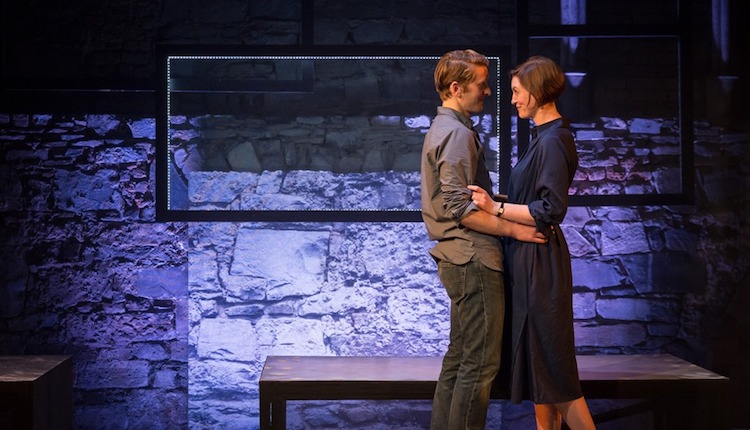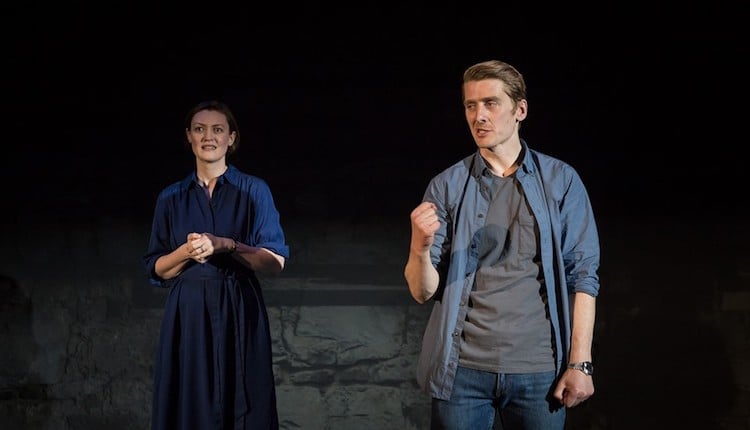Between Memory and Experience: A review of These Stupid Things
[Spoiler Alert for all of you who are going to see the play]
Hugh Travers plays have been long-listed for the Bruntwood Prize, the Verity Bargate Award and the Papatango New Writing Prize. His new play These Stupid Things which is running at Smock Alley Theatre is a truly excellent production with superb acting. The play is part of the Festival of Curiosity which is an annual international festival of science, art, design & technology. It is a play which leaves the audience with many questions, and only some of those are about the play they have just seen. How do we really make decisions? Why do our brains lead us to do stupid things? Is falling in love one of these stupid things? The play does not try to answer these questions directly, but instead, it is a case study with the lives of the two main characters the object of that study. The play is very well written and it is brought to life by two excellent acting performances by Rachel O’Byrne and Ian Toner.
The play begins with a relatively bare stage which is dominated by a set of uneven platforms which are used as the setting for each of the scenes that follow. When we first meet the two characters: Penny (Penelope) and Lenny (Leonard) they have been set up on a quasi-blind date by their friend Sandra. One of the things which they have in common is their birthday. How bizarre you might think until Penny explains that you only need to have twenty-three people in one room in order for at least two of them to share the same birthday. The mysterious serendipity of their meeting loses its sheen immediately. From the start it is Penny who is the logical one, relying on cool analytical thinking while Lenny is all for seeing how things turn out. Lenny loves ifs and maybes, Penny doesn’t have any room for them in her life at all. But love intervenes.

The first two thirds of the play are punctuated by brief seminar like scenes in which Penny and Lenny deliver a brief seminar like interlude. Not only are their some questions for individual members of the audience, but the whole audience is given a series of choices and asked to make a decision between Option A and Option B. It is clear that most people always behave with minimal if any logic.
As the story unfolds we learn about the relationship between Penny and Lenny. There romance turns into living together which turns into marriage which turns into working together and onto attempting to have a child. It is here where the relationship begins to hit the rocks. After months of trying to become pregnant and attempts at IVF, Penny eventually discovers that she is pregnant to the delight of both.
However, their delight and preparations for the baby’s arrival come to a shuddering halt when Penny miscarries. One in five apparently is the chance we are told of this happening by the ever logical Penny. But, if it is so common why do people not talk about it? Why indeed.

Things go from bad to worse for the couple as their jobs get in the way of their relationship and following the death of Lenny’s father, the relationship falls apart. They go their separate ways only to meet nine years later. Lenny is remarried and now has two children. Lenny claims not to have any photos of the children but Penny does not believe this and she is presented with the obligatory photo from his wallet. It is a sad moment for Penny who sees all that might have been.
To make matters worse, the reason for the meeting is that Lenny has cancer and wants Penny’s advice on the best course of action. Penny refuses to make (yet another) decision for Lenny and the play ends with a memory of their meeting while on holiday in Thailand. A happy memory.
The play is far more than just a story. As the play winds towards the end, we begin to see that Lenny and Penny are far more than just two characters. They are two halves of the human brain. The remembering self (that drives the car) and the experiencing self (that gets forgotten).
The play is a study (literally at times) of memory and logic and human nature. It’s rather unusual audience participation works brilliantly and one feels to learn something by the end of the play. Tiny decisions can have a huge impact, people are irrational and the Baader Meinhof Phenomenon is not a terrorist group. There are many other questions which pop up during the course of the play. Why do doctors make mistakes which can cost lives? The answer is simple, they are human. Maybe we can look forward to the growth of AI and machine learning in healthcare.
The two actors remain on stage for the duration of the play. This is no mean feat. But, more than that they are engaging from start to finish and the audience hung on their every word. Both were excellent, albeit in slightly different ways. The performance of Rachel O’Byrne is very natural and her ability to portray both logical tranquillity (‘Some people devote themselves to mindfulness, I practice factfullness’ she tells us early in the play) and high emotion at various points during the play is brilliant. But, throughout, she has a great presence on the stage. Even when lying down in bed, silently grieving for her dead baby.
Some people devote themselves to mindfulness, I practice factfullness.
Not to be outdone, Ian Toner also has a great presence and charts the development of Lenny throughout the play with a deft touch. For two actors to carry a play for almost two hours without losing any of their ability to keep the audience is a credit to both O’Byrne and Toner, the writing of Travers and the great direction of Sarah Baxter which pulled it all together.There is so much in the play that I have a feeling I may have missed some of the more subtle points and I would definitely like to see it again. i will definitely look forward to seeing other productions from White Label and everyone involved in this truly thought provoking and enjoyable play.
Penelope: Rachel O’Byrne
Leonard: Ian Toner
Writer: Hugh Travers
Director: Sarah Baxter
Producer: Paddy Jo Malpas
Associate Producer: Aoife Brady
Lighting Design: Bill Woodland
Set + Costume Design: Sarah Foley
Sound Design: Vincent Doherty
A White Label Production supported by Science Foundation Ireland. With development support from Kildare County Council, Fringe Lab and Dublin Science Gallery.
Running Time: 105 minutes with no interval
